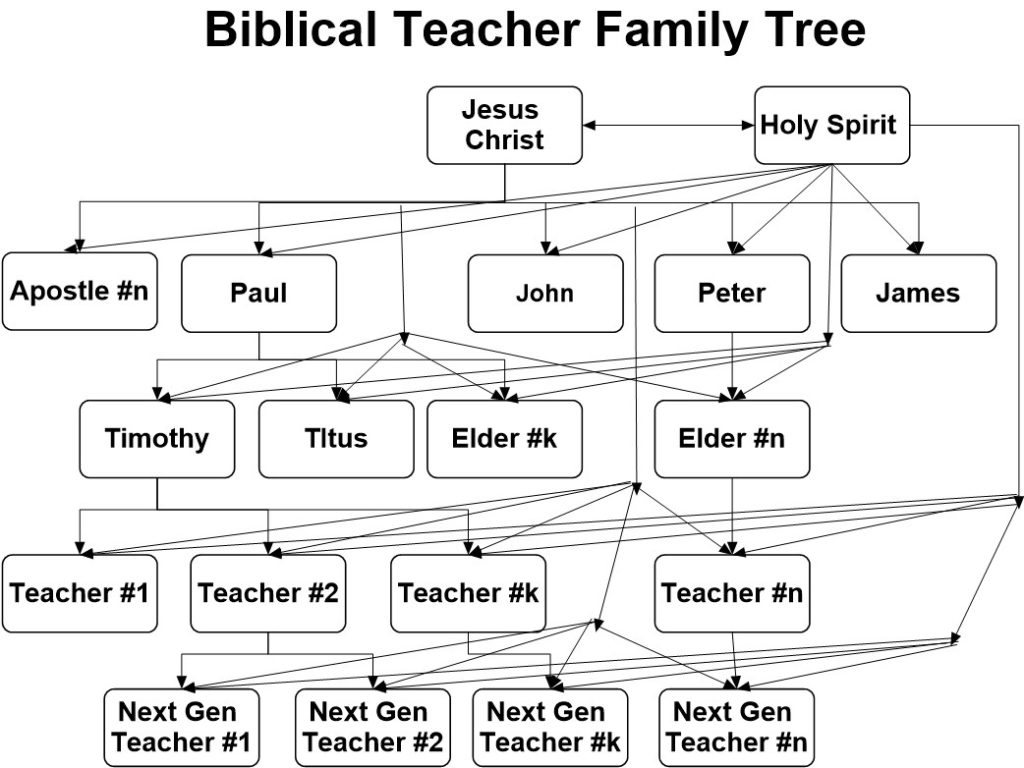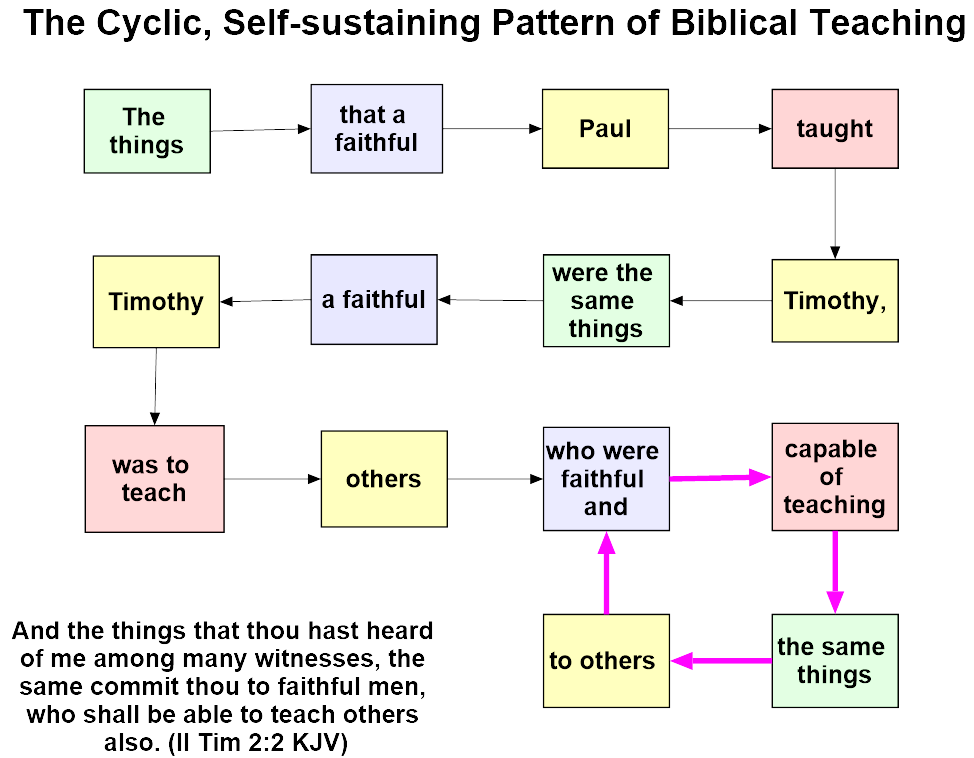
As indicated in the previous post, Lesson III-Part A , from my Four Lessons from Five Verses series, I took my Memorial Day, Independence Day and Labor Day posts from the first five verses of chapter 2 of Paul’s second letter to his protege Timothy. The first post focused on the attributes of a good soldier taken from verses 3 and 4. The second looked at how to be a winner using verse 5 as the text, while the third began to look at the repetitive, self-sustaining cycle of Biblical Teaching from verse 2. It looked at the office, qualifications and work of a Biblical teacher. This post continues looking at that same verse:
And the things that thou hast heard of me among many witnesses, the same commit thou to faithful men, who shall be able to teach others also. (II Timothy 2:2, KJV)
I freely admit that the wording in the KJV of this verse baffled me at first. My initial reading was that Paul was suggesting to Timothy that he concentrate on things that he heard “about” Paul from many people who had observed Paul’s action and preaching. However, Timothy didn’t need to hear about Paul from others, because Timothy had sat directly under Paul’s teaching. He had lived with him, and traveled with him. Timothy had personally witnessed and heard Paul preach and live out the winsome gospel with his own eyes and ears. I believe that Paul is telling Timothy in this passage to concentrate on those things Timothy heard and saw Paul say and live out in the presence of many witnesses.
In the King James Version, this verse begins with the phrase “And the things that thou heard of me among many witnesses,..” The English preposition “of ” comes from the Greek preposition para which together with its variation par appears 200 times in the New Testament. These two Greek words are all purpose prepositions. They are translated at least seven different ways in the King James Version, with another 10 variations in other versions of the Bible. Three things help determine the meaning of the word para in particular situations. We begin with a grammar lesson. A preposition is a word that shows the relationship of the noun or pronoun following the preposition, known as the object of the preposition, and some other word or element in the sentence known as the subject. In II Timothy 2:2, the preposition “of” is describing the relationship between “things,” the subject, and “Paul”, represented by the pronoun “me,” the object. In Greek we have one additional clue to the meaning of a preposition. That clue is found in the grammatical case of the object. In English, the most distinctive use of grammatical case is the Genitive case signifying possession. In the sentence “We are going in my car,” the subject is “We”; the preposition is “in” and the object is “car.” With the possessive pronoun “my”, we know the car belongs to me.
In the Greek, objects following the preposition para (παρά) take three different cases. These cases are the genitive, accusative and dative. In the Greek, the case of a given noun or pronoun can be visibly seen by the form of the word. In English, the case of nouns and pronouns are more generally defined by their usage. The only exception to this is with the genitive case which signifies possession. The genitive pronoun for a male person is “his” while the dative and accusative pronouns take the same form “him.” The accusative case reflects the direct object of a preposition, while the dative case represents the indirect object of a preposition. In II TIm 2:2, in the preposition phrase “things…of me” the Greek word translated “me” is emou (ἐμοῦ) which is in the genitive case. This signifies that the subject of the preposition “things” belonged to or were inherently part of Paul. Thus, it makes more sense to think of the things spoken of here to be the actual words, teachings and life of Paul.
However, there is far more to be gleaned from this verse. Verse 2 also lays out a multi-step family tree that can be extended indefinitely. It begins with Christ, who commissioned and ordained Paul as a master teacher, who received his commissioning and marching orders from Jesus Christ. Timothy was Paul’s student, apprentice and protege. Timothy was in turn destined and charged with the responsibility of becoming a teacher for the next generation of students and teachers. In this passage Paul is giving us God’s plan for the spread of the gospel and his teachings. God was going to raise up a self-sustaining tree of preachers and teachers who would in turn nurture and train the next generation of preachers and teachers.
While Christ was present with the disciples, he could teach them directly. After his resurrection and ascension into heaven, was anyone going to teach and help Paul and the other apostles? God the Father had made provision for that. In John 14, Jesus tells his disciples that he would not always be with them, but that God was not going to leave them alone.
15 If ye love me, keep my commandments. 16 And I will pray the Father, and he shall give you another Comforter, that he may abide with you for ever; 17 Even the Spirit of truth; whom the world cannot receive, because it seeth him not, neither knoweth him: but ye know him; for he dwelleth with you, and shall be in you. 18 I will not leave you comfortless: I will come to you. 19 Yet a little while, and the world seeth me no more; but ye see me: because I live, ye shall live also. 20 At that day ye shall know that I am in my Father, and ye in me, and I in you. (John 14:15-21, KJV)
Through the Holy Spirit, God’s Comforter, Paul and Timothy had direct access to help from God. But this aid was not available to only Paul and Timothy. Since the time of Christ’s ascension, it has available to every Christian, especially those commissioned as teachers.

What was Paul’s responsibility as a Master Teacher? According to I Corinthians and Ephesians, Paul was to follow Christ and faithfully teach the next generation. What was the responsibility of the next generation? They were to remember what Paul did and taught. They were to keep the ordinances that Paul delivered unto them. They were to help teach and perfect the next generation so that they would mature in faith. They were not just to strive to resemble Paul. They were to be like Christ.
Be ye followers of me, even as I also am of Christ. Now I praise you, brethren, that ye remember me in all things, and keep the ordinances, as I delivered them to you. (I Corinthians 11: 1 & 2, KJV)
But unto every one of us is given grace according to the measure of the gift of Christ. Wherefore he saith, When he ascended up on high, he led captivity captive, and gave gifts unto men. (Now that he ascended, what is it but that he also descended first into the lower parts of the earth? He that descended is the same also that ascended up far above all heavens, that he might fill all things.) And he gave some, apostles; and some, prophets; and some, evangelists; and some, pastors and teachers; For the perfecting of the saints, for the work of the ministry, for the edifying of the body of Christ: Till we all come in the unity of the faith, and of the knowledge of the Son of God, unto a perfect man, unto the measure of the stature of the fulness of Christ: That we henceforth be no more children, tossed to and fro, and carried about with every wind of doctrine, by the sleight of men, and cunning craftiness, whereby they lie in wait to deceive; But speaking the truth in love, may grow up into him in all things, which is the head, even Christ: (Ephesians 4: 7 – 15, KJV)
In the two centuries since Christ taught and commissioned that first level of teachers, we have seen more than 60 levels of students, turned teachers. We no longer have the physical presence of Christ or Paul to follow. However, we have the scriptures and we have the Holy Spirit to guide in our study and interpretation of the Word of God. We also have the stories and the lives of the saints who have gone on before us.
I end this post with Paul’s statement about scriptures to Timothy:
But continue thou in the things which thou hast learned and hast been assured of, knowing of whom thou hast learned them; And that from a child thou hast known the holy scriptures, which are able to make thee wise unto salvation through faith which is in Christ Jesus. All scripture is given by inspiration of God, and is profitable for doctrine, for reproof, for correction, for instruction in righteousness: That the man of God may be perfect, thoroughly furnished unto all good works. (II Timothy 3:14-17, KJV)
We need to remember a big part of “all good works” is teaching and leading the next generation.





















